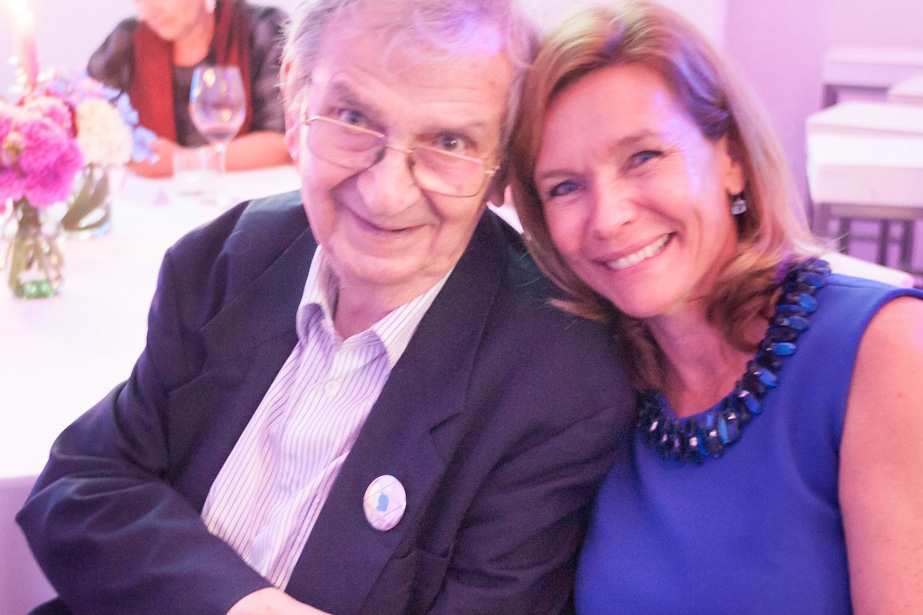Translated from the obituary in profil, January 14th 2016
http://www.profil.at/shortlist/ausland/ari-rath-nachruf-7940405
The former editor in chief of the “Jerusalem Post” died last week in his old hometown Vienna. Tessa Szyszkowitz remembers a journalist legend, who was not only a colleague, but a friend.
Ari Rath did everything with total devotion. He was a caring and wise friend. And that is particularly worth mentioning given the fact that he had about a thousand best friends, half of which were women who were a lot younger than him. Ari had the talent to make instant friendships for life. These relationships became even more numerous and more intense the longer he lived.
His deep, emphatic interest in people and their stories defined his career. He was editor in chief of the English-speaking Israeli daily newspaper “Jerusalem Post” from 1975 to 1989. He became one of the most important chroniclers of Israeli history. As a young man he worked with David Ben-Gurion and Teddy Kollek, building up the State of Israel. He established contacts in New York while representing a Zionist youth organization. After a short honeymoon, his marriage collapsed because his wife could not understand why he could not stay at home when David Ben-Gurion met Konrad Adenauer in New York. Ari just had to be there.
He was a walking encyclopedia. And he loved to share his knowledge. He could also analyze political events faster than others. This ability probably saved his life. Ari was born on January 6th, 1925 in Vienna. He grew up in Porzellangasse 50 in the 9th district of the city. Then, his father was arrested and detained in Dachau. When Ari and his older brother experienced the Anschluss in March 1938, Ari knew what they had to do: leave. They emigrated to Palestine.
In his new homeland he observed meticulously and with passion as Israel went from an aspiring young state to an occupying power. In the 80s he felt a growing sense of unease with the political direction his country was taking. When the liberal Jerusalem Post was sold and turned into a right wing battle organ, he lost his job.
I met Ari for the first time when I came to Israel with a delegation of Austrian politicians and Jewish representatives. It was January 1991, and Saddam Hussein was attacking Israel with Scud rockets. The old jews of Vienna sat in the shelter of the Hotel Hilton, put gas masks on and told us jokes. When I, the 23 year old reporter, stumbled out of the shelter, a 69 year old gentleman was waiting in the lobby. Ari Rath looked at me briefly and said: “Let’s go and have a Gulash soup at Fink’s.” Fink’s was the hangout of West Jerusalem’s political in-crowd. Ari was frequently seen there.
At the end of his life, Ari returned to Vienna. Here he finished his autobiography with the German author Stefanie Oswalt. “Ari Means Lion” was published in German in 2012. Only a few days ago, Ari was told that his book was about to be published in English. He gave one interview after another – about Israeli politics, but also Austrian politics. He went from school to school to talk about the Second World War. He was a central part of Doron Rabinovici’s production in Vienna’s Burgtheater “The Last Witnesses”. Ari even went to New York to present this show only a few months ago. On December 4th, 2016 he was one of those beside themselves with joy that Austria had rejected a far right candidate for president and voted for an independent economist. After all, Ari had been a part of his supporter’s committee.
His lust for life seemed insatiable. He was always the last one to leave the dance floor. When, at his 90th birthday party in Bruno Kreisky’s former home, he received the highest medal of honour of the city of Vienna, we danced a waltz. At a party in September 2016 we tried the waltz for the last time.
This Christmas was the first in many years that Ari could not celebrate with my family. His heart was already too weak, and he couldn’t leave the hospital. On his 92nd birthday he insisted on inviting all his friends to his room. His Palestinian friend Saleh Turujman flew in from Washington DC. One week later, Ari’s heart stopped beating.
When I said goodbye, he said with rather atypical resignation in his voice: “Tessale, I would not have thought that I would spend my 92nd birthday in the hospital!” But he still insisted on setting a date – for our next waltz.



